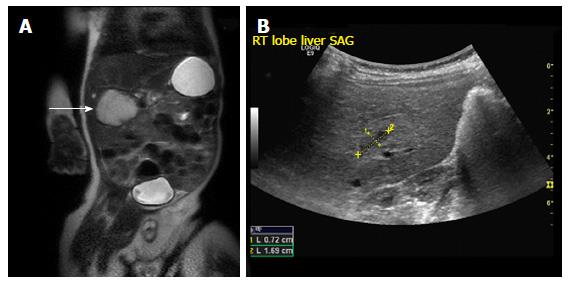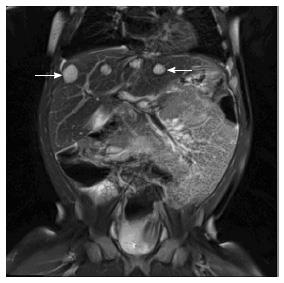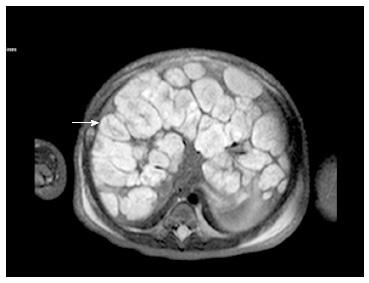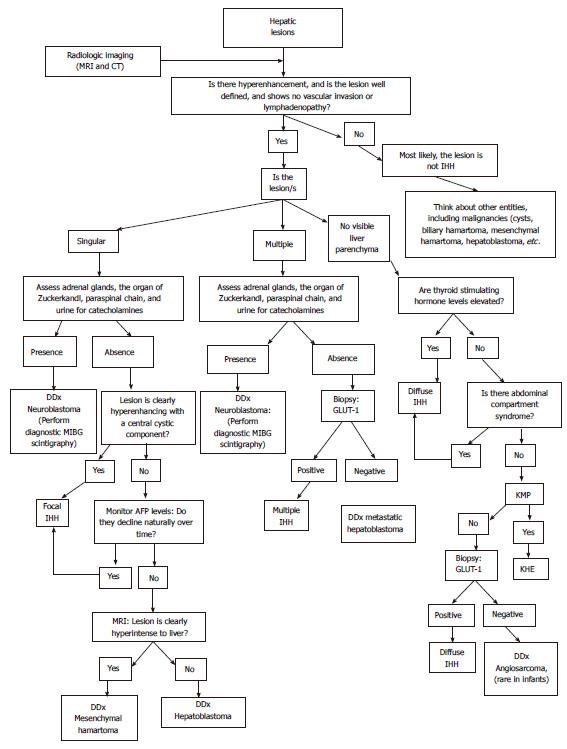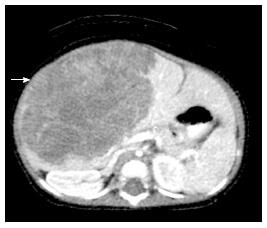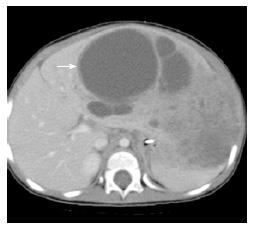©The Author(s) 2016.
World J Clin Pediatr. Aug 8, 2016; 5(3): 273-280
Published online Aug 8, 2016. doi: 10.5409/wjcp.v5.i3.273
Published online Aug 8, 2016. doi: 10.5409/wjcp.v5.i3.273
Figure 1 Focal infantile hepatic hemangiomas.
A: Coronal T2 weighted MRI image through the abdomen of an 8-wk-old boy revealing a large hyperintense mass arising from the liver (arrow); B: Abdominal USG of the same patient at 17-mo-old shows a minimal residual scar (demarcated by calipers). USG: Ultrasonography; MRI: Magnetic resonance imaging.
Figure 2 Multiple infantile hepatic hemangiomas.
Coronal T2 weighted MRI image through the upper abdomen in a 5-mo-old girl depicts multiple well-defined, T2 hyperintense masses in the liver (arrows). This was consistent with multifocal infantile hepatic hemangiomas. MRI: Magnetic resonance imaging.
Figure 3 Diffuse infantile hepatic hemangiomas.
T2 weighted axial MRI image of a 7-d-old with diffuse hemangiomas. Note the innumerable T2 hyperintense masses throughout the liver with central hypo-intense central regions (arrow). MRI: Magnetic resonance imaging.
Figure 4 A schematic algorithm to guide physicians through correct diagnosis and management of hepatic lesions.
IHH: Infantile hepatic hemangioma; CT: Computed tomography; MRI: Magnetic resonance imaging; DDx: Differential diagnosis; GLUT-1: Glucose transporter-1; AFP: α-fetoprotein; KHE: Kaposiform Hemangioendothelioma.
Figure 5 Hepatoblastoma.
Axial computed tomography scan after the injection of IV contrast material in a 7-mo-old girl demonstrates a poorly enhancing large mass within the liver (arrow).
Figure 6 Mesenchymal hamartoma.
15-mo-old with abdominal distention: Axial computed tomography scan after the administration of IV contrast material demonstrates a large multi-cystic mass arising from the liver (arrow). Additional mixed solid and cystic elements are present laterally in the expanded left hepatic lobe.
- Citation: Gnarra M, Behr G, Kitajewski A, Wu JK, Anupindi SA, Shawber CJ, Zavras N, Schizas D, Salakos C, Economopoulos KP. History of the infantile hepatic hemangioma: From imaging to generating a differential diagnosis. World J Clin Pediatr 2016; 5(3): 273-280
- URL: https://www.wjgnet.com/2219-2808/full/v5/i3/273.htm
- DOI: https://dx.doi.org/10.5409/wjcp.v5.i3.273













